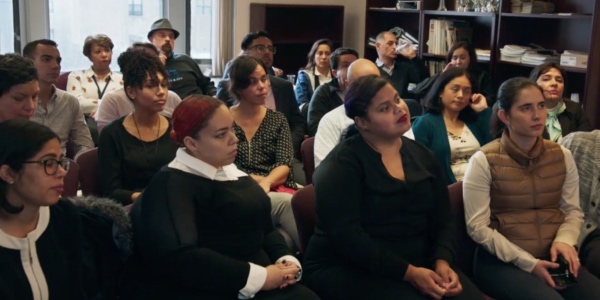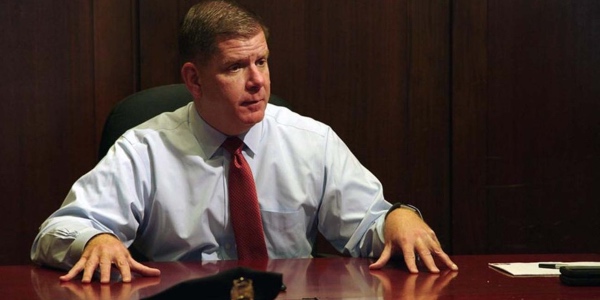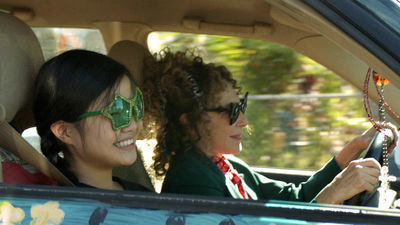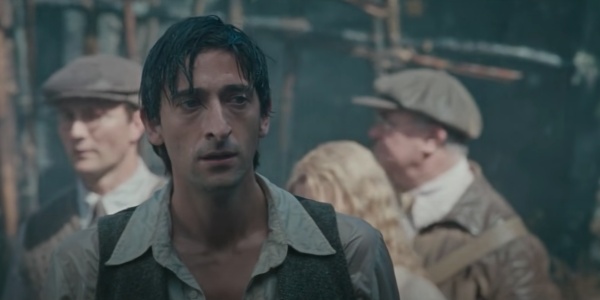NYFF 2020: City Hall
In a world where much of the focus is on national and international politics, the specifics of local governments remain a mystery. While we, as citizens, have some say in who takes these primary seats of office, those who keep our cities alive go beyond elected officials. What exactly happens at our local hubs and their branches? And to what extent are our city officials interwoven into our everyday life? Enter City Hall.
Using Boston, MA as a focus point, City Hall, from director Frederick Wiseman, gives us an in-depth look at the interconnectivity of the city through the daily tasks of those employed by the city. Though as Mayor Marty Walsh states at the beginning of this four and a half hour epic, “We don’t do a good enough job of telling that story of what we actually do in the city. And I don’t think we do a good enough job tying it all together.” City Hall is here to rectify that job.
Boston, MA
About the community of Boston. City Hall doesn’t focus on its residents, but the beating heart that keeps the city functioning and alive. And there is so much to this heart. You are shown the vastness of the jobs that the city hall provides. There is rhythm and heartbreak, tenacity, and resilience, seen through each meeting, each outreach community event, and through each job. Value is placed not just on the individual employed, but on the work, they do for Boston as a whole.

These aren’t just officials in suits, though. City Hall takes into account as many employees and positions as it can. From the garbage men to the records department, and the traffic ticket disputes to the building inspectors, City Hall stresses the main goals of each of its employees and the necessity of their jobs to the city and the citizens of Boston.
After the documentary concludes, you get the feeling that Wiseman‘s film was not just about the people and their service to the city, but the outreach and community they hope to serve. There are constant meetings, from different committees, regarding the housing issues throughout Boston to the budgets affecting the city. Mayor Walsh is seen several times throughout the film, engaging in discussions with minority groups and informing the elderly of scams that could affect them, and even participating in the city’s championship parade for the Red Sox.

City Hall goes beyond just the mayor. Wiseman shows town halls to discuss and explain the city’s budget, showing the challenge in bridging the gap between civilian and official. Historical preservation also falls in line with the responsibility of city officials, not only to maintain museums but to interact and keep the stories of veterans and their families alive. Town halls and community outreach are a vital aspect of Boston’s city government, highlighting the need to “listen to stories without judgment and with full support.”
The Ups and Downs
City Hall is a beast of a film at over four hours and 30 minutes. Unfortunately, while it wants to honor both the work of the city officials as well as those they are serving, it threatens to lose its viewers. It might have benefited more if it has been developed for a docuseries. With an extensive amount of overlap, there could have been an episode dedicated to housing, ethnicity, and diversity, decreasing disparity across a variety of platforms, maintaining history and anthropology, and so on. There is a lot packed in, yet there is little “action” in the traditional sense to maintain the attention of casual viewers.
This is, however, a great documentary for those residing in Boston and wanting to know more about the decisions and the process they are immersed within. City Hall will also strongly resonate with those seeking and living a life of public service. It showcases the work they do when typically they are the silent puppeteers creating functionality in the city. As for others, again, the length will present this film as a tedious task.
Like the officials in City Hall, the documentary “listens to stories without judgment and with full support.” It checks all the boxes for what the city should be addressing, including but not limited to diversity in city contracts, racism, homelessness, and veteran’s support. Whether Wiseman is showing residents in Dorchester speaking their concerns or veterans relaying their stories, their voices want and deserve, to be heard. The constant showcase of the city listening to its people does feel forced at times, and the length causes you to momentarily forget the city’s efforts, struggles, and successes.
Conclusion: City Hall
Animal shelters, food banks, or parking officials, the list of city jobs is never-ending, yet each is a vital aspect of the continuing functionality of Boston and its citizens. While City Hall has its ups and downs, it gives viewers a unique experience and perspective into the inner workings of Boston’s city officials. While the job titles may be vast and the responsibilities may vary, at the end of the day, it is all about the community.
Have you seen any films at the New York Film Festival? Let us know what you thought in the comments!
City Hall is screening as part of the Main Slate at the 2020 New York Film Festival.
Watch City Hall
Does content like this matter to you?
Become a Member and support film journalism. Unlock access to all of Film Inquiry`s great articles. Join a community of like-minded readers who are passionate about cinema – get access to our private members Network, give back to independent filmmakers, and more.
Join now!





